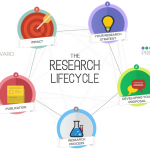 Research Development and Support (RDS) run induction sessions for all new starters and those who want a refresher in research. We recently revamped these so that we could have more interactive conversation on the induction day. In order to do this, we created a series of videos, which were sent to attendees three weeks’ beforehand.
Research Development and Support (RDS) run induction sessions for all new starters and those who want a refresher in research. We recently revamped these so that we could have more interactive conversation on the induction day. In order to do this, we created a series of videos, which were sent to attendees three weeks’ beforehand.
We’re now making these videos available to all BU staff who want to get started with research at BU or want a refresher.
The videos can be found on Brightspace. The link should take you to the section ‘RDS Academic and Researcher Induction’ (if it doesn’t, you just need to scroll down to this section). There are nine videos in total (most are quite short and the longest one (five) runs to ~20 minutes). The video topics are:
- Overview of research at BU and Research Development and Support (RDS)
- Overview of the Funding Development Team
- Overview of the Project Delivery Team
- Overview of the Knowledge Exchange and Impact Team
- Applying for Research Funding at BU
- Managing your awarded grants
- Research Outputs
- Research Ethics
- Research Impact
If you can’t access the Brightspace link, please contact us at ResearchDev@bournemouth.ac.uk.
As a reminder, you can find a whole host of supporting information on research at BU on the research blog under ‘research toolkit‘ and ‘research lifecycle‘.
 Getting started with research at BU – videos
Getting started with research at BU – videos Funding Development Briefing. Spotlight “Getting Started at BU”.
Funding Development Briefing. Spotlight “Getting Started at BU”.










 Beyond Academia: Exploring Career Options for Early Career Researchers – Online Workshop
Beyond Academia: Exploring Career Options for Early Career Researchers – Online Workshop UKCGE Recognised Research Supervision Programme: Deadline Approaching
UKCGE Recognised Research Supervision Programme: Deadline Approaching SPROUT: From Sustainable Research to Sustainable Research Lives
SPROUT: From Sustainable Research to Sustainable Research Lives BRIAN upgrade and new look
BRIAN upgrade and new look Seeing the fruits of your labour in Bangladesh
Seeing the fruits of your labour in Bangladesh ECR Funding Open Call: Research Culture & Community Grant – Apply now
ECR Funding Open Call: Research Culture & Community Grant – Apply now ECR Funding Open Call: Research Culture & Community Grant – Application Deadline Friday 12 December
ECR Funding Open Call: Research Culture & Community Grant – Application Deadline Friday 12 December MSCA Postdoctoral Fellowships 2025 Call
MSCA Postdoctoral Fellowships 2025 Call ERC Advanced Grant 2025 Webinar
ERC Advanced Grant 2025 Webinar Update on UKRO services
Update on UKRO services European research project exploring use of ‘virtual twins’ to better manage metabolic associated fatty liver disease
European research project exploring use of ‘virtual twins’ to better manage metabolic associated fatty liver disease